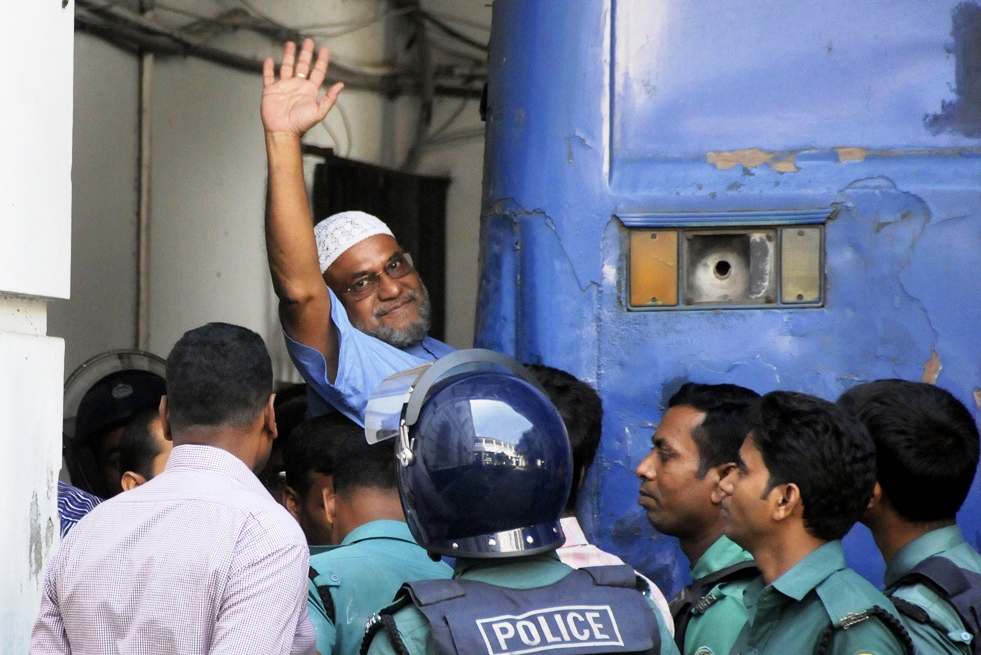
The war crimes court found wealthy businessman Mir Quasem Ali, an official of the JI party, guilty of 10 charges including murder and abduction during Bangladesh's 1971 war.
Ali, 63, stood up and loudly protested as the chief judge announced the sentence in a packed court.
"It's a motivated judgement," he said, adding it was handed down on the government's orders.
Ali, who owns a television station and newspaper aligned with Jamaat, was convicted of running a militia torture cell that carried out killings including that of a young independence fighter.
"The country and the people affected have finally got justice. Mir Quasem Ali has been sentenced to death for the murder of a teenage freedom fighter, Jashim," prosecutor Ziad al Malum told reporters.
"The young boy was abducted and his body was thrown in the Karnaphuli river," he said.
Jamaat's top leader Motiur Rahman Nizami was on Wednesday sentenced to death for heading a militia in 1971, a decision that sparked protests by supporters.
Jamaat called a nationwide strike following Nizami's verdict. The stoppage was still in force Sunday, with many schools and businesses closed and traffic thin.
The party announced plans for a new strike on Thursday in protest at Ali's death sentence.
Similar judgements against other Jamaat officials last year plunged the country into one of its worst crises. Tens of thousands of Jamaat activists clashed with police in various protests that left some 500 people dead.
Ali, also a shipping and real estate tycoon, became the eight JI leader sentenced to death by the controversial war crimes court, set up by Prime Minister Sheikh Hasina's secular government in 2010.
Ali, a former leader of Jamaat's powerful student wing, helped revive the party by setting up charities, businesses and trusts linked to it after it was allowed to operate in the late 1970s.
The tycoon, who was arrested in 2012 on 14 war crimes charges, heads the Diganta Media Corporation which owns a pro-Jamaat daily and a television station.
The government shut down the television station last year for inflaming religious tensions.
Defence lawyer Tanvir Ahmed al Amin called the charges against Ali "baseless and false" and said they would appeal the verdict in the Supreme Court.
"We've not got justice despite proving that he was not at the crime scenes during the war," the lawyer said.
Jamaat and the main opposition Bangladesh Nationalist Party have accused the government of using the war crimes court to target their leaders through phoney charges.
Rights groups have also criticised the trials, saying they fall short of international standards and lack any foreign oversight.
Hasina's government maintains the trials are needed to heal the wounds of the conflict, which it says left three million people dead.
Independent researchers estimate that between 300,000 and 500,000 people died in the 1971 war.
COMMENTS (10)
Comments are moderated and generally will be posted if they are on-topic and not abusive.
For more information, please see our Comments FAQ




1732626034-0/BeFunky-collage-(92)1732626034-0-165x106.webp)


1732618327-2/Untitled-design-(7)1732618327-2-270x192.webp)









indian conspiracy
@goggi (Lahore): Agree with your sentiment on death penalty. Justice systems are made for fixing the culprits and not just eliminating them from society. But then there are few which makes you wonder if they deserve human rights for being so inhumane towards their own being.
In any India Pakistan cricket match in Dhakka you see more pakistani flags then Indian flags.Bangladesh govt even tried to prohibit carrying of 'foreign flags' (foreign should be read as pakistani). It has been frustrating for Haseena Wajid to see her country still in pro-pakistan and pro-indian grouping. Which might have freshen up the old wounds. But revenge makes reconciliation even more hard.
Why dont they give the same punishment to usa and israel for mass murders
Justice must bedone ..today or tomorrow..
If anyone thinks justice is being done by the Bangladeshi government (B-gov), their heads need re-aligning to focus away from cloud 9 and on to the real world where truth is bitter and not easy to swallow.
The truth is that is this this Hasina Wajjid's revenge.
Often the "International Court of Justice"(ICJ) set up by Bangladesh does not have the benefit of full evidence against the accused. There are deep flaws in the way the ICJ is run.
I wish the capitol of Pakistan would have been Dhaka, the elegant sari-clad Sheikh Hasina our PM (Pradhan Mantri), the sweet Bengali our national language and our thousands of years precious cultures above all the imperialistic and despotic religions of foreigners.
I am against death penalty, wars and killings of living beings. As a peace loving human it is my moral duty to appeal to the courts of Bangladesh to convert the death penalty of all the convicted in life imprisonment. Only Mother nature has the right to take life as she gives us. Humanity’s single most important moral imperative is to preserve life!!!
Alhamdolillah who gave Bangladeshi government this courage.
The message given is that the government is not afraid to hold people accountable........a good lesson for others to learn.